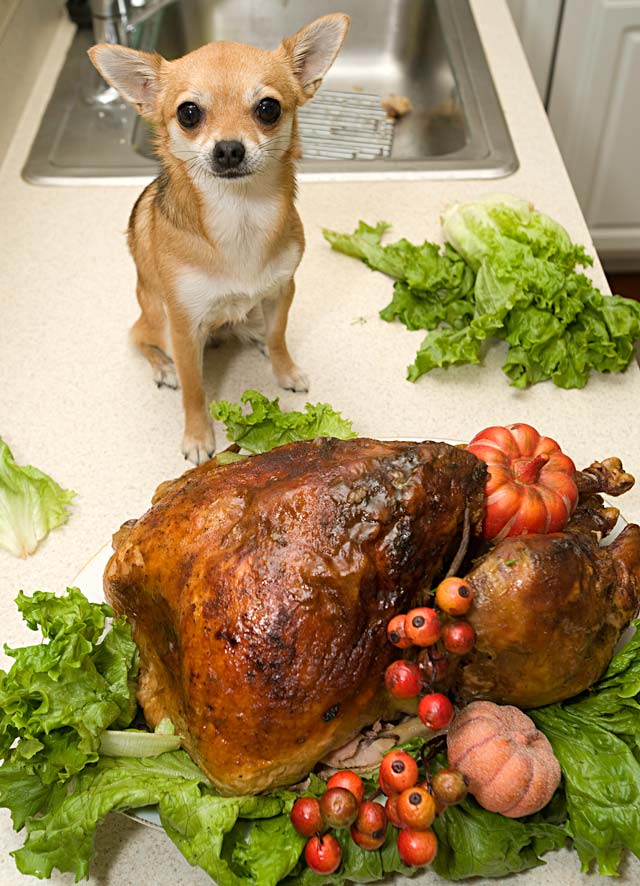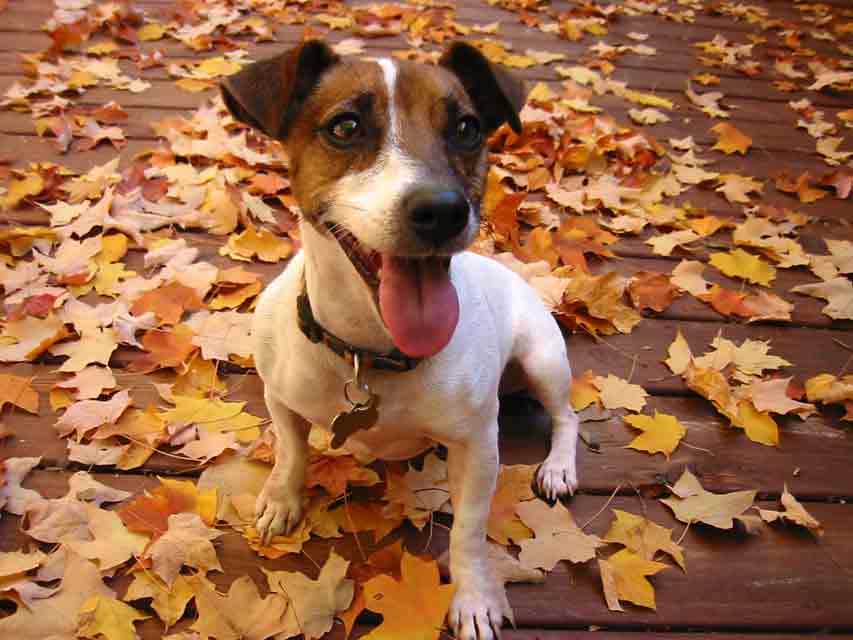Thanksgiving Safety for Dogs

Thanksgiving is a joyful holiday for most people. But it can be a hazardous time for your dog. Prepare yourself and your canine pal for the upcoming holiday with these timely tips.
Holiday Stress, Canine Style
Social dogs may love the bustle of the holiday. But for shy dogs, it can be stressful. House guests, new faces, and disruptions in the daily routine can take a toll on a sensitive dog. Skittish dogs may be tempted to snap or bite. Escape artists may see an opening when guests linger at the door. Anxious dogs are prone to misbehavior of all sorts: barking, house-soiling, and destruction.
You know your dog. An outgoing dog can be the life of the party. But if your canine pal isn't a social butterfly, be safe, not sorry, by confining him to his crate or in a separate room before the guests arrive. Offer your dog a new toy or, in particular, a Kong Blue toy to occupy his attention until the excitement subsides. Mask the noise with a soothing classical CD. Or pop in a "for dogs only" video to distract from the commotion. Natural stress relievers or comforting dog pheromone sprays, collars, or diffusers can be very efficacious as well.
Thanks, But No Thanks!
Who can ignore Fido's rapt, mouth-watering stares as the turkey comes out of the oven? Who hasn't been tempted to sneak him a tidbit under the table? It's natural to want to share the bounty with your dog on Thanksgiving, but it's not always safe. Here are some hazardous treats that might be on your table:
- Toxic foods. Several foods are edible for humans but harmful for dogs. Garlic, onions, grapes, raisins, avocados, Macadamia nuts, coffee, alcohol, and especially chocolate are all toxic when eaten in sufficient quantity. These foods should never be shared with your dog. You can learn about the most common toxic foods to dogs in our slideshow article, "Foods Toxic to Dogs." If your dog is ill after indulging in any of these foods, consult your veterinarian right away. If your veterinarian isn't available, call your local animal emergency clinic or the Pet Poison Hotline at 855-764-7661.
-
Dietary Intolerance. Foods that are fine for one dog may not sit well with another. Dogs, like some people, can be lactose intolerant and unable to handle milk or milk products. Others are sensitive to abrupt food changes. Vomiting, cramping and diarrhea can result. Simple overeating could give anyone a case of indigestion. Some dogs just don't know when to stop. Finally, a dog that gets into the garbage and eats a large amount of leftovers could be at risk for developing pancreatitis or GDV, a serious bloating and twisting of the canine stomach. You can learn more about bloat here: “Bloat in Dogs: Gastric Dilatation and Volvulus (GDV).”
- Pancreatitis. Indigestion is one thing; pancreatitis is another. Pancreatitis is defined as inflammation of the pancreas. It can be triggered by an overly fatty meal, especially in individual dogs or certain breeds like miniature Schnauzers. Once the process starts, digestive enzymes that are made in the pancreas can leak, causing a destructive vicious cycle. Most cases respond to treatment. But an unlucky few progress to multiple organ failure and even death. Signs of pancreatitis include moderate to severe vomiting, abdominal pain, and diarrhea, along with lethargy, lack of appetite, and fever. If your dog exhibits such signs after indulging on Turkey Day, seek veterinary care immediately.Learn more here: “Pancreatitis in Dogs.”
Protect your dog with a few easy precautions. Consider substituting low-fat store-bought for turkey and giblets and your dog may be none the wiser. If you must share people food, offer only lean meat and bland side dishes, ones devoid of sauces or spices. Avoid all forbidden foods, as well as anything excessively fatty, such as gravy, pan drippings or stuffing. Don’t give anything with bones because they can cause choking, broken teeth, or life-threatening intestinal perforations. Ration leftovers over several days rather than indulging your dog all at once. Make sure all family and guests follow these rules as well.

Garbage Gut
Dogs are scavengers. And what could be more tempting to a scavenger than an unsupervised trashcan full of juicy scraps, fatty trimmings and a tasty turkey carcass! Poultry bones can easily splinter or get lodged in the mouth, throat or digestive tract with serious consequences. Discarded items such as string, foil wrap, and moldy or spoiled food often found along with tasty scraps can cause equal amounts of trouble.
Be sure to keep garbage out of your dog's reach in a tightly sealed container. If the outdoor trashcan is a target, consider freezing the bones until trash day and then taking them straight to the curb.
And if your dog does experience vomiting, diarrhea, lethargy, or any other unusual symptoms after eating things he shouldn't, consult your veterinarian right away. An ounce of prevention is worth a pound of giblets. Your dog will thank you.
You May Also Like These Articles:
Emergency Care for Suspected Poisoning
Foods Toxic to Dogs - Slideshow
Disclaimer: This website is not intended to replace professional consultation, diagnosis, or treatment by a licensed veterinarian. If you require any veterinary related advice, contact your veterinarian promptly. Information at DogHealth.com is exclusively of a general reference nature. Do not disregard veterinary advice or delay treatment as a result of accessing information at this site. Just Answer is an external service not affiliated with DogHealth.com.
Notice: Ask-a-Vet is an affiliated service for those who wish to speak with a veterinary professional about their pet's specific condition. Initially, a bot will ask questions to determine the general nature of your concern. Then, you will be transferred to a human. There is a charge for the service if you choose to connect to a veterinarian. Ask-a-Vet is not manned by the staff or owners of DogHealth.com, and the advice given should not delay or replace a visit to your veterinarian.



